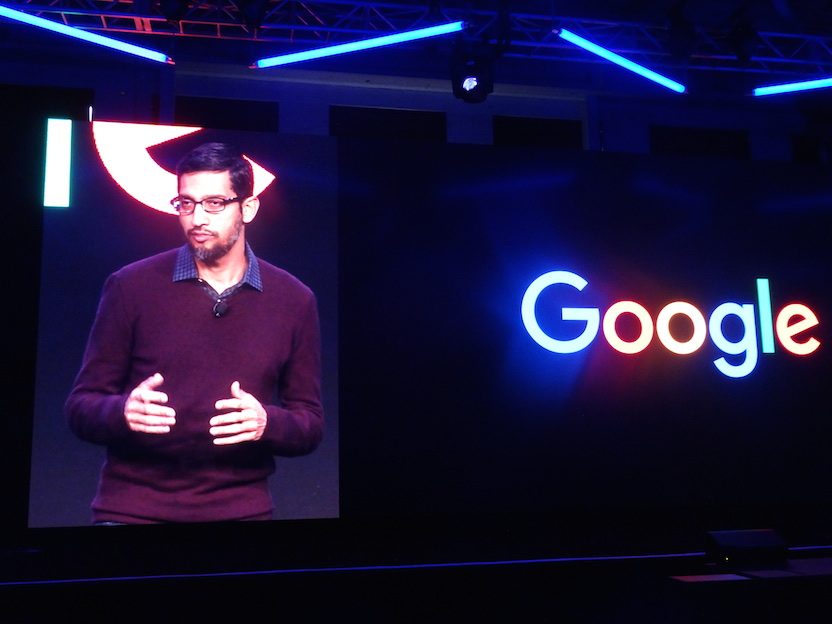 EMERGING TECH
EMERGING TECH
 EMERGING TECH
EMERGING TECH
 EMERGING TECH
EMERGING TECH
Despite more than a year of cutting back on farflung projects, Alphabet Inc. today reported fourth-quarter profits that fell below forecasts even as revenue growth outpaced expectations.
The parent company of Google Inc. said it earned a profit before certain costs such as stock compensation of $9.36 a share. Revenues rose 22 percent, or 24 percent independent of currency changes, to $26.1 billion.
Analysts on average had forecast adjusted profits of $9.67 a share on revenues of $25.2 billion, up 18 percent.
Investors didn’t especially like the results, no doubt the lower-than-expect profit in particular. Shares were falling more than 2 percent in trading after the regular session’s close today. Alphabet’s shares fell a fraction today, to $856.98, after three straight days of rising to all-time highs. Update: Investors decided it wasn’t all that bad. In trading Friday, shares were down only about a half-point.
“This performance was led by mobile search and YouTube,” Alphabet Chief Financial Officer Ruth Porat said in a statement. “We’re seeing great momentum in Google’s newer investment areas and ongoing strong progress in Other Bets.”
Advertising revenues, which account for the vast majority of Google’s revenues, rose 17.4 percent, to $22.4 billion. Analyst seemed sanguine about that business because mobile and video ads are accelerating and Google maintains a near-duopoly with Facebook Inc. on digital advertising. “Overall, we think the quarter should be viewed positively,” Pivotal Research Group analyst Brian Wieser wrote in a note to clients.
Despite Porat’s cost-cutting, capital spending rose substantially, from $1.8 billion a year ago to $2.9 billion in the fourth quarter.
“Other revenues,” which include Google hardware, app store sales and cloud computing, jumped 62 percent, to $3.2 billion, from a year ago. Investors are keen to figure out how both Google’s cloud business and its hardware business, which includes the new Pixel smartphones, the Google Home smart speaker and the Daydream View virtual reality viewer all introduced in November, are doing.
Porat said in comments during the conference call that hardware, cloud and Play app store sales all were strong. It’s tough to tell because apps and cloud almost certainly account for much more of those revenues than hardware. But one analyst, Jan Dawson of Jackdaw Research, reckoned new hardware might have contributed $600 million to $700 million in revenues.
Google Chief Executive Sundar Pichai (pictured) said Google Cloud is gaining momentum fast, thanks to targeted efforts in machine learning, data analytics and security. “Our cloud business is on a tremendous upswing,” he said in comments on the call. “We constantly hear from customers that we have moved well beyond table stakes.”
However, many observers have pointed out that Amazon Web Services may still be gaining ground, with Microsoft Azure keeping a solid hold on second place in the base-level Infrastructure-as-a-Service computing and storage services. “What we’re not really seeing a lot of are improvements in enterprise-based cloud services,” said Patrick Moorhead, president and principal analyst with Moor Insights & Strategy.
Pichai said Google Home in particular was popular during the holidays. “We’re thrilled with the reception,” he said, a statement in contrast with some observers that wonder if it’s gaining against Amazon.com Inc.’s Echo devices. Pichai said the company is “committed for the long term” to Home.
Revenues from “other bets,” which include ventures such as self-driving cars, remote Internet access using high-altitude balloons, and delivery drones, rose 75 percent, to $262 million from a year ago. For the year, revenues jumped 82 percent, to $809 million, mostly from the Nest home device unit, Google Fiber and the Verily life sciences unit. The bet collectively suffered a $2.9 billion operating loss, a slight decline from 2015.
Some of these other bets have had a rough road lately as Porat and other executives have looked to zero in on those most likely to pay off. In the third quarter, the unit had an operating loss of $840 million on $197 million in revenues.
In the past year, Google stopped expanding its city fiber project amid rumors of the project’s possible sale to an Internet service provider, and even the head of Project Wing, the drone delivery effort, stepped down and some project members were cut or moved to other projects. But today, Google’s Verily life sciences unit said it raised $800 million in funding from Singapore, suggesting another path to efficiency in the unit.
Sponsored Content: Conquering Enterprise Cloud![]()
Are you an enterprise that wants to move to the cloud?
Learn more about how to Conquer the Enterprise Cloud on 2/2: Free with registration to join the digital event: https://cube365.net/oracle/conqueringcloud
Support our mission to keep content open and free by engaging with theCUBE community. Join theCUBE’s Alumni Trust Network, where technology leaders connect, share intelligence and create opportunities.
Founded by tech visionaries John Furrier and Dave Vellante, SiliconANGLE Media has built a dynamic ecosystem of industry-leading digital media brands that reach 15+ million elite tech professionals. Our new proprietary theCUBE AI Video Cloud is breaking ground in audience interaction, leveraging theCUBEai.com neural network to help technology companies make data-driven decisions and stay at the forefront of industry conversations.